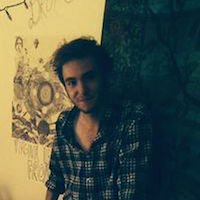The way that one views the world actively helps to shape it.
“Your beliefs become your thoughts,
Your thoughts become your words,
Your words become your actions,
Your actions become your habits,
Your habits become your values,
Your values become your destiny.”
~ Mahatma Gandhi
Unfortunately, our globalized capitalist society doesn’t heed this notion. We live in a world of linearity, rather than a world of cyclical belief systems.
The mainstream paradigm that people have embraced since the beginning of the industrial revolution has been linear, in the sense that we think in terms of things going from: A > B > C > D, rather than observing the world through cyclical, holistic lenses that show the inherent interconnectivity of everything.
For there to be environmental and social progress in our world, we as a global community need to embrace the views that indigenous peoples around the world have known for millennia. These views are holistic, cyclical and cognizant of our planets biological integrity.
Here are a few examples of how our society is stuck wearing linear and stagnant glasses of reality:
The Public Education System in the United States:
Academic studies are segregated by discipline starting in elementary school. Students learn math, then English, then science, then history—all without comprehending that in reality all academic disciplines are connected, and understanding one without understanding the other breeds ignorance and de-evolution.
Societal Expectations and Narratives:
In most cultures where capitalism is the dominant economic ideology, people are unconsciously put into a system, which generally looks something like this:
Childhood > Adolescence > Early Adulthood > Adulthood > Retirement.
Predetermined societal norms for these phases of life are usually something like this: childhood: school, Adolescence: school, early adulthood: school, work and finding mate. In the 21st century America, adulthood often looks like this:
work,
work,
work,
work,
and work some more, doing something that we probably hate so that we can pay mortgage on a house that’s way too big and put our children in daycare resulting in our spending less time with them, only so we can come home from work and numb ourselves with the narcotic haze of the television screen that casts us into living an isolated, alienated and unhappy life.
Retirement: finally being able to quit the job that we’ve hated, giving way for the rest of our life being an existential crisis of wondering why we didn’t follow our passions or do something meaningful with our time on Earth.
Although the above obviously isn’t the case for everyone, I firmly believe that this type of culture is ubiquitous in the 21st century, and many people fall prey to it. Rarely do I talk to an adult who loves whatever job or career they are in.
It always perplexes me, because there are so many problems on our planet and there are also obviously many solutions, which means that all people have the capability to do something amazing with their life.
What Karl Marx philosophized roughly 150 years ago is more truthful today than ever, because capitalism does in fact create and reinforce linear ways of viewing the world that help create false consciousness that in turn breeds alienation, negativity and negative social and environmental externalities.
Don’t Believe Me? Look at the state of our home.
On planet Earth, there are some people that are so miserable that they commit suicide. The amount of people with depression, anxiety, and poor health conditions is absolutely enormous. People die daily because multinational corporations favor profit over people.
That’s not the kind of world that I want to live in.
Although the problems of the world aren’t solely based off of linear thinking, it is certainly a huge component of the problem.
In Nature there are an infinite amount of examples of how, in actuality, things are cyclical and not linear. Basic ecosystem ecology demonstrates this through the concept of food webs and by how healthy ecosystems function. The carbon cycle, the nitrogen cycle, and all of the biogeophysical processes of Earth demonstrate this.
For our planet’s most pressing problems to be solved, and for there to be enlightened society—one that is equitable, sustainable, regenerative and a place that we all are happy to be a part of—we must learn how to think holistically while expressing ourselves through radical compassion. This means seeking the basic, intrinsic goodness in others as well as in ourselves, so we can create the best state of being for every being on Earth.
As Chögyam Trungpa taught:
“A great deal of the chaos in the world occurs because people don’t appreciate themselves.”
Relephant Reads:
Return to the Sacred Hoop: 13 Aspects of Original Thinking.
Our Time is Now.
~
Author: Daniel Emmett Hart
Editor: Emma Ruffin
Photo: Alice Popkorn/Flickr







Read 2 comments and reply